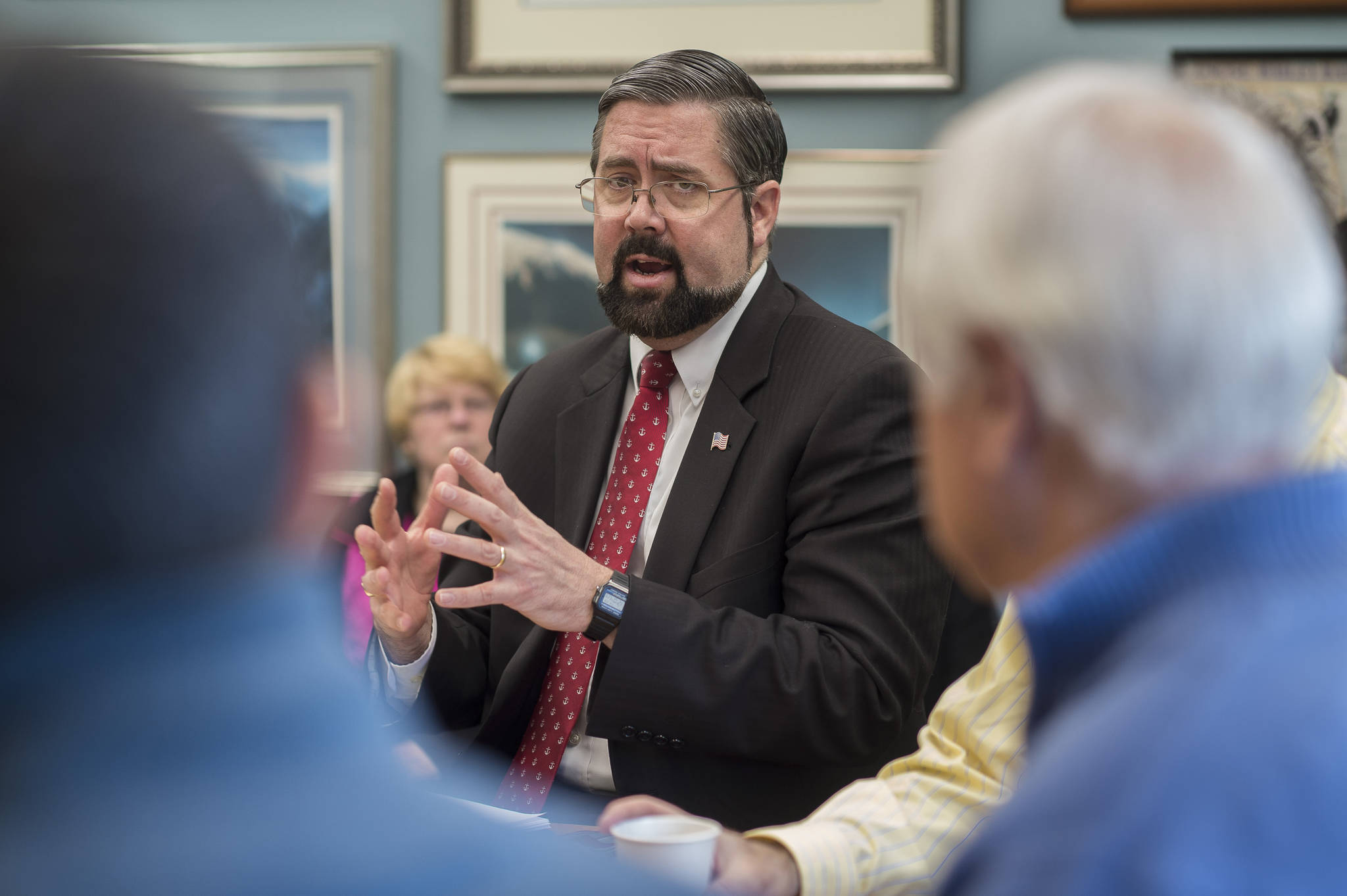It’s a trying time for diplomatic relations between the U.S. and Russia. U.S. intelligence agencies believe Russia meddled in the 2016 presidential campaign. Special counsel Robert Mueller’s investigation into Russian interference will continue longer than expected, it was reported on Wednesday, and more indictments may be added to the current tally of four people associated with the U.S. president.
But the “trust issue” between the U.S. and Russia hasn’t affected the fellow-feeling Russians have for Americans, especially Alaskans, according to Consul General Michael Keays. A visiting diplomat from Juneau’s sister city Vladivostok, Keays spoke on Thursday to Juneau Mayor Ken Koelsch and Assemblymembers Norton Gregory, Rob Edwardson and Deputy Mayor Jerry Nankervis at City Hall.
Those in Russia’s largest far east city still fondly recall the days when the “ice curtain” between Alaska and Russia thawed, leading to a post-Cold War cultural exchange between Alaska and remote eastern Russia in the 1990s, Keays said. Alaskans pushed for cultural and social exchanges in the 1980s and 1990s, building a relationship with Russians in the far east through special Alaska Airlines flights to Vladivostok.
Part of the goal of his trip to Alaska will be to rekindle that relationship.
“I think Alaskans always felt that there are those people over there we can literally see, and we want to get to know them. I think on the Russian side that curiosity left its mark. The people that I work with remember those initial flights and things like that that came over from Alaska Airlines,” Keays said.
Keays arrived in his post in 2016 on a three-year stint. He’s the head of the Vladivostok consulate, one of three in Russia, that report to the U.S. Embassy in Moscow.
There’re only about 40 Americans living in Vladivostok year-round, Keays said, and a couple hundred more working at an Exxon oil project nearby. He wants to see that number grow. Vladivostok is a vibrant city with a strong middle class, Keays said. The wider Russian far east has outgrown its reputation as a lawless frontier where mafia cartels duke in out in the streets.
A steady exchange of students, workers and visitors between Juneau and Vladivostok could bolster the cultures of both cities, Keays said, and by turn, both counties. “People-to-people” diplomacy undergirds what Keays says are cyclical relations between the U.S. and Russia. When relations are poor between the two countries, personal connections can counteract any negative feelings.
Keays said students in Russia have received some kind of tuition break from the University of Alaska system to attend Alaska schools, but he’s not sure of the status of that program. He hopes to meet with UA officials while in Alaska.
Visiting students could be key to breaking down barriers between the two countries. American students are warmly received in the far east, he said.
“In that little way, those students who interact with each other will help break down misunderstandings and stereotypes. That will have a ripple effect when they go back to their respective homes,” Keays said.
Fostering cultural understanding would be another way. Having once been connected by the Bering Land Bridge, Alaska’s indigenous cultures share a lot in common with those in the Russian north and far east.
Keays said Russians have a “real thirst” for indigenous knowledge and would welcome Alaska Native cultural ambassadors.
“Anything that highlights that connection across the Bering Straight between indigenous peoples, people would love that,” Keays said. “What those things do is remind Americans and Russians involved in it of the very special relationship that that part of Russia and Alaska have with each other that the rest of the West Coast and the rest of Russia don’t have.”
Juneau’s Sister Cities Committee helped arrange for Keays’ trip to Juneau. Committee member Barbara Burnett said they hope to see relations between Juneau and Vladivostok become more lively. The committee hasn’t had a contact in recent years with Vladivostok.
In addition to Vladivostok, Juneau is sister cities with Whitehorse, Yukon, and Kalibo, Philippines, but most of the contact the committee has had has been with Whitehorse. Burnett said Keays’ visit “shows a lot of promise” that cultural and economic exchange with Vladivostok will become more frequent.
“We’re anxious to get more people involved,” Burnett said.
There are currently two open positions on the Sister Cities Committee. Applications are available on the City and Borough of Juneau website. The committee meets once a month.
• Contact reporter Kevin Gullufsen at 523-2228 or kevin.gullufsen@juneauempire.com. Follow him on Twitter at @KevinGullufsen.

